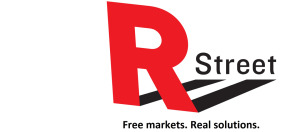 The R Street Institute is a relatively recent arrival in the D.C. think tank world. It advertises itself as a free market think tank with a “pragmatic approach to public policy,” and many of its policy positions do defend market freedom. In its press releases, it devotes considerable attention to legislative and regulatory changes of interest to the insurance industry, which is a relatively arcane specialty.
The R Street Institute is a relatively recent arrival in the D.C. think tank world. It advertises itself as a free market think tank with a “pragmatic approach to public policy,” and many of its policy positions do defend market freedom. In its press releases, it devotes considerable attention to legislative and regulatory changes of interest to the insurance industry, which is a relatively arcane specialty.
On November 2nd, however, R Street sent out a very curious notice with the title “R Street Institute Experts Available to Discuss Recommendations Regarding Intergovernmental Panel on Climate Change Report.” Beginning on a familiar pragmatic, chord, the document expressed a desire to get beyond “the politicized trench warfare that has paralyzed lawmakers” by outlining “three crucial steps that Congress could take today to better prepare Americans for their climate future.”
Then things got weird.
R Street’s three crucial steps were to: (1) phase out the National Flood Insurance Program; (2) expand the Coastal Barrier Resources Act; and (3) enact carbon pricing legislation to preempt proposed onerous EPA regulations.
None of this sounds particularly market-oriented. Step 1 is market-friendly, but it is a sop to the insurance industry. Step 2 makes coastal development more difficult, which would preserve the environment but doesn’t empower markets to do so. And step 3 would lead to de facto regulation of carbon-dioxide output and consumption throughout the entire U.S. economy, leading to almost certain chaos and unintended consequences.
Recently, however, it was revealed that the R Street Institute has accepted more than $580,000 in donations from a group called the Energy Foundation. The purpose of the funds was to “advance policy solutions for a stable climate.” One of the major investors in the Energy Foundation is none other than Tom Steyer, the billionaire, anti-energy zealot who spent tens of millions in the last election in an effort to kill the Keystone XL pipeline.
Mystery explained. I think the world is often too complex for “cui bono?” explanations, but sometimes the simple answer is the correct answer. It is important that we judge organizations on their policies, and not on the identity of their funders. But that is precisely the point here: R Street’s policy positions often belie its claims of a desire to promote free markets. Corporatism, also known as crony capitalism, is antithetical to market freedom, and it is disappointing to see “pay for play” come to free-market think tanks that should know better


Great article Larry, though
it appears your own article contradicts the title you bestowed upon it. While I
agree with what you wrote, you circled back around to show exactly why donors
to think tanks do in fact matter. “One of the major
investors in the Energy Foundation is none other than Tom Steyer, the
billionaire, anti-energy zealot who spent tens of millions in the last election
in an effort to kill the Keystone XL pipeline.” By
naming Tom Steyer as a major donor to R Street, and explaining why he would
donate to such an organization, exemplifies how important it is to know who is
investing in which organizations. The old mantra “Follow the money”
applies here.
Good point Todd. I agree with both you AND Larry on this one. I agree with you that it is always important to “follow the money,” because money has the power to influence. But I also agree with Larry: So long as the integrity of an organization’s mission remains intact, an organization should not be judged based only on its donors. Unfortunately, that does not seem to be the case with R Street in this situation.